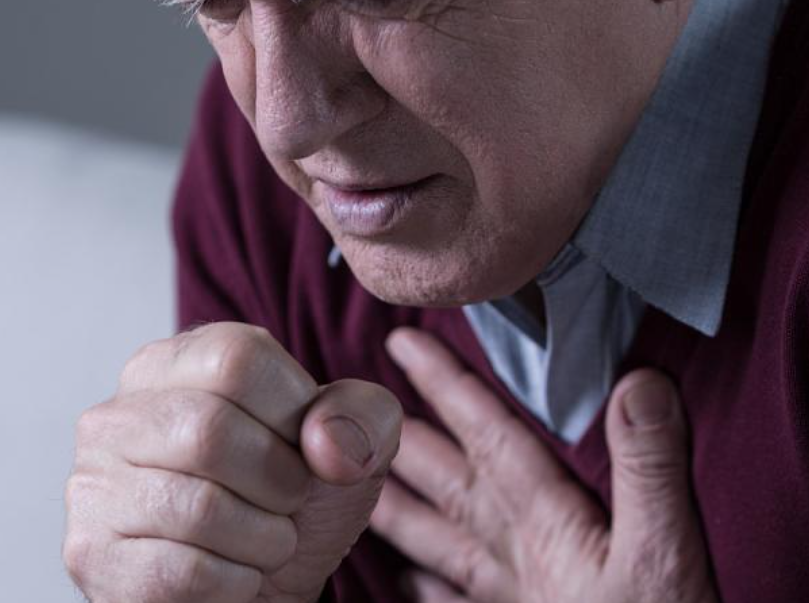
One of the classic symptoms of GERD is chest pain. According to hospital admissions, such patients account for 30% of the total patients with gastroesophageal reflux disease. Why does reflux cause chest pain?
Because of the esophageal dynamic disorder, stomach contents first regurgitate into the esophagus after anti-peristalsis, causing acid reflux, heartburn, and then continue to run to the throat, causing foreign body sensation in the pharynx, resulting in hoarseness and repeated cough, and even part of the reflux will run into the trachea, the delicate airway mucosa can not withstand the torture of stomach contents. So chest pain, chest tightness, shortness of breath, difficulty breathing and other symptoms will follow.
This pain, whether it is the location of the occurrence, or the feeling of pain, are very similar to angina pectoris, often patients think that it is a heart attack, will go to the hospital cardiology department, will not think of the stomach problem.
And over time, the mucosa of the esophagus is stimulated for a long time and causes esophageal spasm to cause pain, so there will be chest pain like cramps, and there will be chest pain similar to angina, or chest pain like myocardial infarction.
Repeated chest pain should be checked early and treated early
There are many symptoms of GERD, including acid reflux, heartburn, chest tightness, cough and phlegm, hoarseness, difficulty breathing, and even high blood pressure.
Therefore, when some symptoms cannot be found, we must think that the culprit may be gastroesophageal reflux disease, rather than blindly thinking of going to the department of cardiology, taking a large number of drugs, and some will do stent surgery, which not only produces drug side effects, but also spends expensive costs.
If the elderly have repeated chest pain, chest stuffy shortness of breath, burping after meals, acid reflux, heartburn and other symptoms, be sure to go to the hospital as soon as possible, if there is a local gastroesophageal reflux disease specialist, gastroscopy, esophageal 24-hour acid measurement and esophageal pressure measurement and other related examinations, timely screening whether suffering from gastroesophageal reflux disease.
If there is no gastroesophageal reflux disease specialty, it is also possible to go to the general gastroenterology department, and the preliminary diagnosis of gastroesophageal reflux disease can be carried out through gastroscopy, so that the disease can be early detection, early diagnosis and early treatment.
People over 60 should be extra careful
Gastroesophageal reflux (GERD) is a common disease with chest pain, chest tightness, shortness of breath, heartburn, acid reflux and other symptoms related to GERD. This is because the atrophy of esophageal muscle group leads to lower esophageal motor function, lower esophageal sphincter resting pressure, and decreased anti-reflux defense ability.
Another point is that the elderly are getting older, especially those over 60 years old, and the cardiopulmonary function is declining, with chest tightness, shortness of breath, and difficulty in breathing. Because of the poor scavenging ability of reflux, delayed gastric emptying, and long exposure of esophageal mucosa to reflux, the elderly are prone to chest pain, acid reflux, heartburn and other symptoms after eating.
Not all patients, especially the elderly, need surgery. Because the elderly are older and have poor physical conditions, they are first treated by some simple methods, and most of them will have obvious effects through diet control and drug treatment first.
Seven points to avoid gastroesophageal reflux
-
Control your diet. It is necessary to eat less and more meals, and it is appropriate to eat seven or eight times full each time, because over-satiety causes increased pressure in the stomach, and stomach qi is transmitted, which can lead to reflux.
-
Don't take medications long-term. If antibiotics and nitroglycerin are taken for a long time, gastroesophageal mucosa will be damaged to some extent and esophageal sphincter pressure will be reduced.
-
Don't smoke or drink. Smoking relaxes the lower esophageal sphincter, leading to acid reflux. Drinking alcohol will make the esophagus peristaltic, resulting in a decrease in the ability of the esophagus to clear acidic substances.
-
Do not eat too much high-fat and high-protein diet, because obesity will increase abdominal pressure, and it is easier to "squeeze" the objects in the stomach back to the esophagus, and do not eat 2 to 3 hours before going to bed.
-
The elderly should pay attention to the fact that they can not lie down within 3 hours after a meal, because most elderly people will have the phenomenon of cardiac relaxation, and if they lie down after a full meal, it is easy to have many reflux complications.
-
When sleeping at night, raise the head of the bed by 30 degrees, so that the esophagus is in a sloping position, so that the stomach contents are not easy to reflux up, because the water flows down.
-
Do not lift heavy objects, do not climb too high stairs, do not do strenuous exercise to avoid squeezing the chest.

